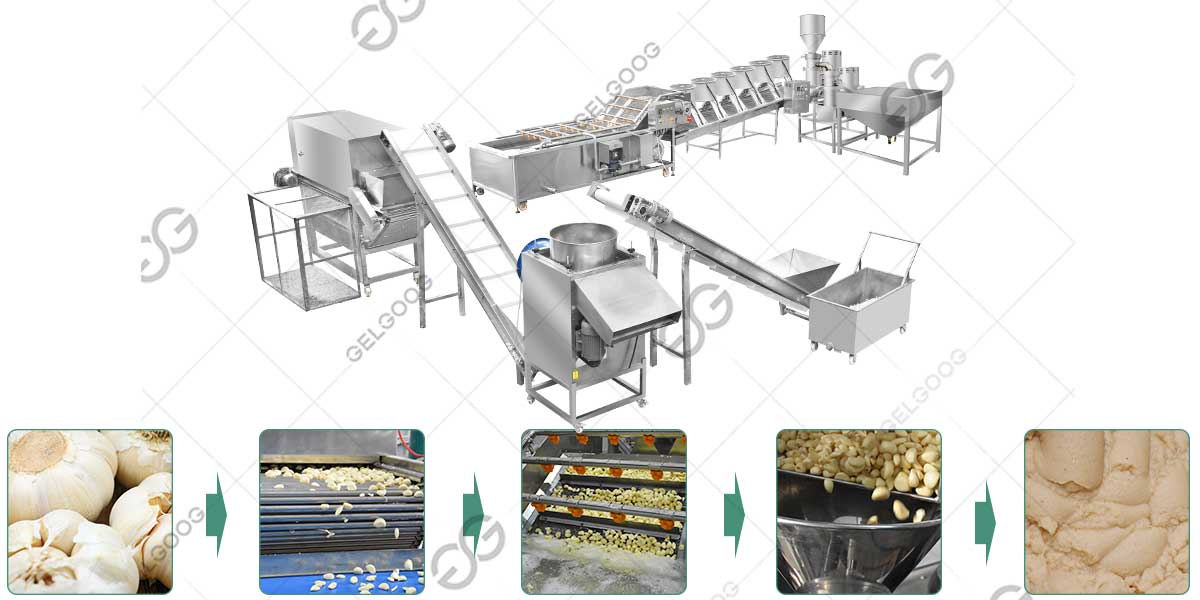
Garlic paste is a sauce-like condiment made from fresh garlic through a series of processing steps. The processing equipment is garlic paste production line. And the basic processing flow is as follows:
1. Garlic breaking
Garlic breaking of the whole bulb garlic is the first step in garlic paste processing. This step is completed by an automatic garlic breaking machine, which effectively improves efficiency and reduces labor costs.
2. Peeling
The garlic needs to be peeled after breaking. The peeling machine can efficiently peel the garlic skin, keep the garlic cloves intact, and avoid oxidation or contamination caused by damage.
3. Cleaning
The peeled garlic cloves are thoroughly cleaned of dirt, impurities and residual skin through a multi-stage cleaning machine to ensure the hygienic requirements of subsequent processing.
4. Grinding garlic into paste
The cleaned garlic is ground into paste by the paste grinder. The equipment can be adjusted according to the different taste requirements of customers for the finished product. It can not only process delicate garlic paste, but also retain a certain granularity, which is suitable for garlic paste products with different market positioning. This step is the core step in the garlic paste processing plant.
5. Ingredients (optional)
Depending on the product formula, you can add vegetable oil, salt, spices, food additives and other seasoning ingredients in this step and mix them evenly.
6. Filling
The mixed garlic paste is quantitatively packaged by the filling machine and is suitable for various packaging forms such as bottles, bags, and cans.
7. Sterilization
In order to extend the shelf life of the product and prevent microbial contamination, the garlic paste after filling usually needs to be sterilized in a water bath. The sterilization method can also be flexibly selected according to the product formula and packaging materials.
It should be noted that the above garlic paste production line is the main production step of conventional garlic paste, but the specific processing steps may be adjusted according to different recipes. For example, garlic paste with added edible oil needs to be emulsified after grinding.
● In order to ensure the flavor, quality and safety of garlic paste, the following key points should be noted during operating the garlic paste production line:
● Raw material selection and storage: Fresh, disease-free garlic should be used as raw material. Garlic should be stored at low temperature and dry after entering the garlic paste processing plant to avoid sprouting or rotting.
● Prevent oxidation and discoloration: Garlic paste is very susceptible to oxidation during processing, resulting in discoloration and flavor loss. Therefore, the contact with air should be minimized during the grinding process, which can be done by adding antioxidants or processing in a vacuum environment.
● Temperature control and sterilization: The sterilization temperature and time should be strictly controlled during the processing to ensure the sterilization effect while avoiding excessive heating that may lead to flavor loss or oil-water separation.
● Equipment cleaning and disinfection: The garlic paste production line should be cleaned and disinfected regularly to prevent bacterial growth and avoid cross contamination.
● Accurate ingredient ratio: Different recipes of garlic sauce require different ratios of oil, water, salt and other ingredients, which should be controlled through a standardized ingredient system to ensure product stability and consistency.